- Local growth and regeneration
- Public & community engagement

King’s College London
Institutional context.
King’s is a world-leading university dedicated to finding solutions to urgent global challenges through our teaching, research and collective impact.
A civic university at the heart of London, we have five main campuses across the capital, with three co-located alongside major NHS hospitals, together with sites in Oxfordshire and Cornwall .
We are a research-intensive, multi-faculty university with a diverse range of subjects and disciplines, employing >9,000 staff and have >33,000 students, with an annual income of c.£1.15bn.
Our diverse and inclusive community of students, staff and alumni comes from across London, the UK and >150 countries around the world, and we are ranked 5 th in England by the Times Higher Education World University Rankings (2023).
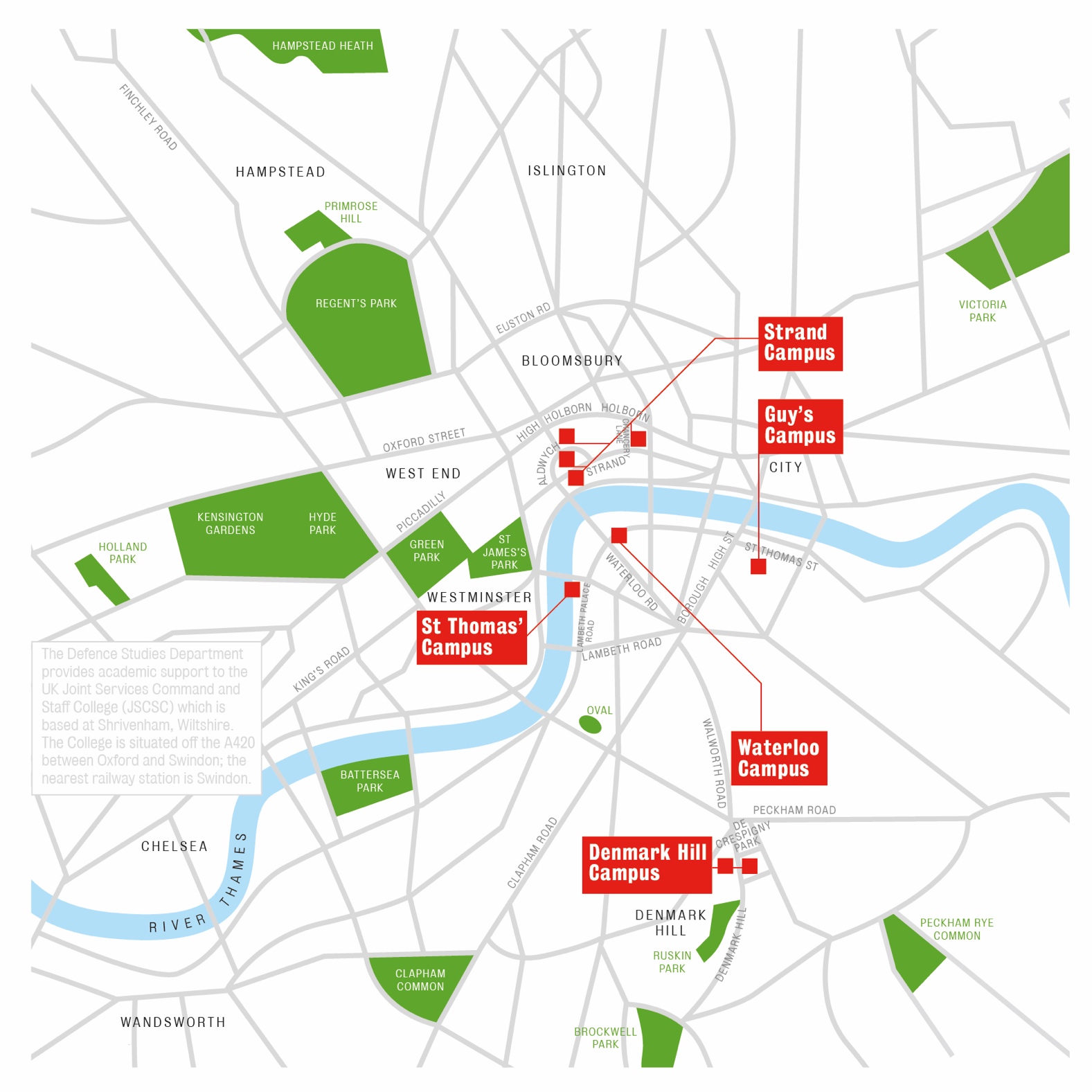
Institutional context
King's Strategic Vision 2029 sets out bold ambitions for the future of King’s as we look towards our 200th anniversary: to make the world a better place through our excellence in education, research and our service to society.
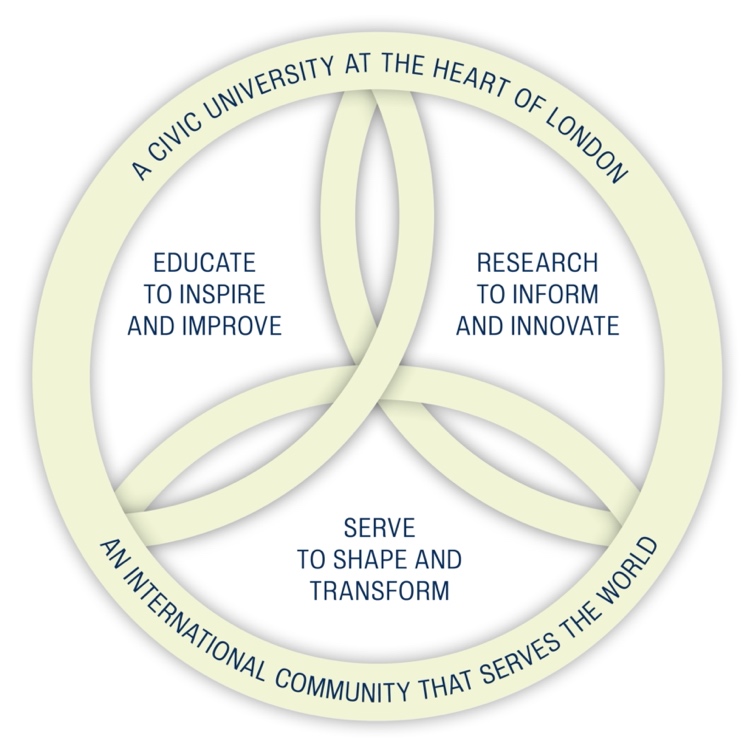
Central to these ambitions is our commitment to working in partnership to respond to local, national and global priorities and challenges (see Fig. 2). A major part of this is collaboration and co-creation with communities across London, within the boroughs our campuses are based, and in Cornwall which is home to King’s Service Centre.
King’s education and research portfolio extends from world-class health and biomedical activity, to internationally-prestigious arts, humanities, social sciences and law; alongside major investment and growth in engineering and natural/mathematical sciences.
Through our commitments to the United Nations Sustainable Development Goals (UN SDGs) and by embedding sustainability into our teaching, partnerships, impact and operations, we are supporting the worldwide effort to build a better future for our people and planet.
Our Knowledge Exchange and Innovation Ecosystem (Fig. 3) aligns academic priorities with professional services expertise, physical infrastructure, and impact funding. Key components include:
Innovation@King’s unifying expertise in commercialisation, industry partnerships and translational research.
King’s Entrepreneurship Institute supporting entrepreneurial thinking, skills and action among students, staff and alumni.
King’s Policy Institute connecting research to policy and responding to society’s challenges with evidence and expertise.
King’s Culture drawing together artists and cultural partners with students, staff and alumni to drive innovation and insight through arts and culture. Science Gallery London is our flagship public space for students, staff and local communities.
King’s Health Partners (KHP) connects King’s with three leading NHS Trusts through an NIHR/NHS England-accredited Academic Health Science Centre. SC1 is a Life Sciences Innovation District that brings together KHP with local councils to foster public-private partnerships and develop equitable solutions to society’s complex healthcare challenges.
Partnerships with Government including the Strand Group , Global Institute for Women’s Leadership and King’s Global Health Partners to influence societal change.
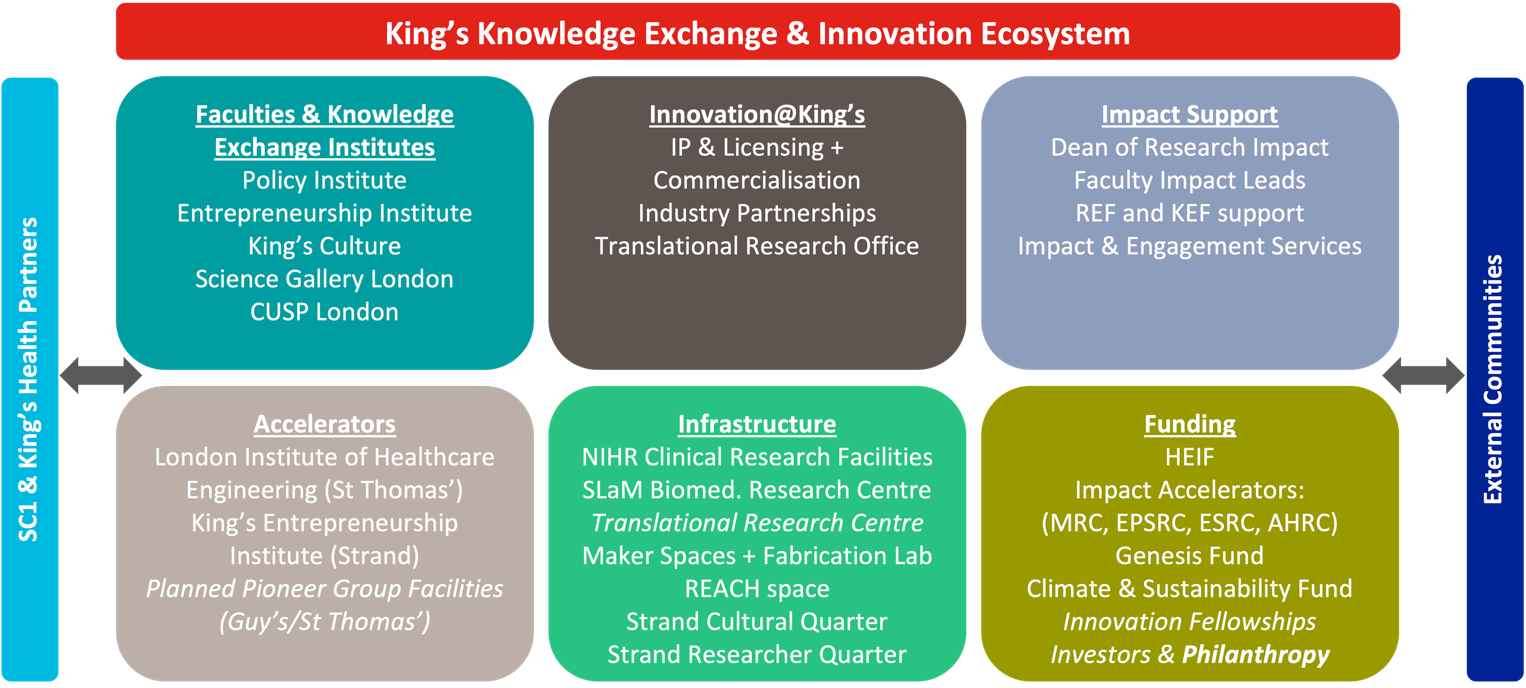
Figure 3: King's Knowledge Exchange and Innovation ecosystem aligns our expertise
with infrastructure and funding to deliver impact
King’s commitment to a capital-wide, hyperlocal focus with our home boroughs is set out in King’s Civic Charter and bespoke statements of intent with Lambeth, Southwark and Westminster. We work in close partnership with councils, charities and civic organisations to respond collaboratively to local societal challenges.
This work is strengthened by “clusters” connecting the university, industry and other partners, including the NHS, to enhance knowledge exchange. Working with local authorities and investors, we have developed hubs for MedTech (St Thomas’), Biomedical Science (Guy’s), Neuroscience & Mental Health (Denmark Hill), and digital, social, creative, business (Strand) bolstered by industry partnerships with Siemens Healthineers, Medtronic, Nvidia, GSK, UCB, Unilever, SMEs in cell therapy, MedTech/AI and more.
Our knowledge exchange is delivering real-world impact demonstrated by our 3 rd place ranking for impact amongst multi-disciplinary universities in REF2021 and 4 th place in England in the Times Higher Education Impact Rankings (2022).
Abbreviations table
For further information, please send queries to [email protected]
Local Growth and Regeneration
Summary of approach.
King’s Vision 2029 makes Service an equal part of our academic mission, alongside Education and Research. We strive to go beyond what might be expected of a university to serve, shape and transform local communities and societies through teaching, research, operations and actions.
Our partnerships are essential to delivering these commitments as they are built on collaboration and co-creation to facilitate positive change. We bring together three leading NHS Foundation Trusts through King’s Health Partners, and work closely with local communities and Councils in our home boroughs of Lambeth, Southwark and Westminster and King’s Service Centre in Cornwall.
Our accelerators provide SMEs, start-ups and spinouts access to our rich translational ecosystem connecting academia, industry and the NHS.
Aspect 1: Strategy
King’s Vision 2029 , was developed following consultation with all members of the King’s community; local communities, authorities and businesses. It sets out our ambition to be a civic university at the heart of London, working in partnership to contribute to the success of the city in which we make our home. We deliver both capital-wide activity and a honed focus on King’s ‘home’ boroughs of Lambeth, Southwark and Westminster. Through the King’s Civic Charter and bespoke Statements of Intent with our three home boroughs, we seek to challenge inequality, build capacity and grow resilience within our local communities.
Service embodies King’s commitment to social impact and societal change, at home in London, across the UK and around the world. Through our teaching, research, and targeted initiatives, such as Civic Challenge , London Venture Crawl and prioritising procurement from local businesses, we contribute to London’s long-term prosperity and growth.
Alongside our commitment to London, King's Service Centre plays a key part in both the life of King’s and the local community in Cornwall by providing professional services support to our students and staff and bringing high-skilled career opportunities and training to Cornwall. We are developing partnerships to meet the needs of local communities and develop mutually beneficial initiatives.
We have committed to strengthening the impact of our research through enhanced support and engagement to accelerate social and economic benefit to the communities we serve in London, the UK and globally through equitable partnerships .
We bring together three leading NHS Foundation Trusts – Guy's and St Thomas', King's College Hospital and South London and Maudsley – through King’s Health Partners (KHP) to contribute to the health and wellbeing of local residents and by providing training and skills development to healthcare workers.
King’s, with KHP, have developed a strategy to cultivate an environment where start-ups and SMEs can flourish, bringing innovation in translational research rapidly to market, and where we can partner with multinational companies to accelerate product development and evaluation. This will enhance research, create skilled jobs, attract investment and improve the health and lives of people in our local communities and across the capital.
KHP is now building on the strength of our partnerships with Lambeth, Southwark and the Guy’s & St Thomas’ Foundation through a major strategic initiative to build SC1 – London's Life Sciences Innovation District. SC1 will be a world-recognised ecosystem for transformative innovation with health equity at its heart. It seeks to foster public-private partnerships to develop solutions to society’s complex healthcare challenges.
Aspect 2: Activity
By using our knowledge with purpose and co-creating new knowledge in partnership, we can benefit all our communities and develop life-changing ideas with local impact and global relevance. Examples include:
Meeting the needs of our local areas
As part of our commitment to King’s home boroughs we have signed statements of intent with Lambeth, Westminster, and Southwark outlining areas for collaboration and mutual priorities, informed by each organisation’s strategic ambitions and strengths. This provides a framework for King’s students, staff and alumni to work with local communities and residents to co-create solutions to shared problems and challenges.
We have worked residents of Lambeth, Southwark and Westminster using peer research, photo diaries and deliberative workshops to understand the lived experience of the cost of living crisis and co-create policy interventions . These are now underpinning the local authorities’ strategy and decision making.
Our City, Our Future : Masters students from King’s Business School co-designed a peer researcher project with the Young Westminster Foundation to identify the needs of young people in Westminster. The report produced identified the top 3 political/social issues facing young people in Westminster as Covid-19, Crime & Safety and Tackling Racism.
Building Better Futures : Following a listening exercise engaging over 700 local Lambeth residents, a report was published with recommendations to inform a social mobility action plan being co-produced between King’s, Lambeth Citizens and Lambeth Council. This work will help to break down barriers to achievement for local young people.
King’s Civic Challenge invites participants to work together to develop collaborative and creative solutions to issues identified by communities in Lambeth, Southwark and Westminster. Winning projects were awarded £5k, an evaluation package and ongoing coaching to help make their projects more impactful.
Economic growth
Our focus on knowledge exchange is demonstrated through our hosting of MedCity (connecting industry and universities across London), leadership of Research England’s UK Advanced Therapies (with dedicated SME engagement funding), and leadership of the Innovate UK London AI Centre for Value-Based Healthcare (4 universities, 11 NHS Trusts, 6 industry partners and 11 SMEs). King’s are also supporting and collaborating with local businesses with free consultancy services from our students.
King’s has a commitment to socially responsible procurement, guided by our sector-leading policy on local procurement . For instance we worked with local social enterprises and suppliers to produce thousands of reusable face coverings for staff and students returning to campus following the pandemic. King’s also helped to establish a social fund with the first projects funded in our home boroughs through King’s Civic Challenge.
King's Service Centre in Cornwall is home to an innovative and forward-thinking team of professional services staff. We have recruited over 200 local colleagues, invested in the training and development of staff and created Graduate and Apprenticeship opportunities. We are also developing Cornwall’s Digital and IT future talent by working with Cornwall College, local schools and businesses to offer personal and professional growth to local people.
King’s has been working with the Centre for London to monitor the impact of Covid on London, tracking impacts on the labour market, air pollution, the economy and society. King’s is also a partner in the Productivity Institute to improve productivity and economic recovery in London and the South.
SC1 brings together seven partners with over a century of healthcare innovation history, and a shared purpose of tackling the lack of health equity, to put life sciences at the heart of London’s ecosystem. SC1 is underpinned by four strategic pillars that anchor its vision . These include 1. Entrepreneurship Enterprise and becoming the ‘go to’ ecosystem for start-ups, entrepreneurs and SMEs; 2. Partnership - providing a framework and synergistic fit for BioPharma, Big Tech and the investment community; 3. Employment & Skills focusing on leveraging local talent; and 4. Real Estate across the three Innovation Hubs that provides the space to realise this unique vision.
The London Institute of Healthcare Engineering (LIHE) brings together King’s research excellence, Guy's and St Thomas' NHS Foundation Trust’s leading clinical practice and the MedTech sector’s commercial innovation power and talent to engage multinationals, SMEs and start-ups. The close collaboration will ensure that research in healthcare engineering is translated rapidly into new products and technologies that will benefit patients.
King’s has invested £15m towards the construction of the LIHE building with further investments in support for innovation and enterprise, including a new Accelerator. This builds on our existing 12-month Accelerator programme King’s20 supporting the 20 highest potential ventures across King’s, providing them with training and mentoring, access to desk space, investors and internal funding. We have a partnership with Santander to improve EDI in entrepreneurship, focusing on Women Entrepreneurs and students from underrepresented groups.
Our Joint Venture with our two NHS Trust partners, KHP Ventures , offers equity investments with healthcare expertise for ground-breaking MedTech and digital start-ups to improve health and healthcare.
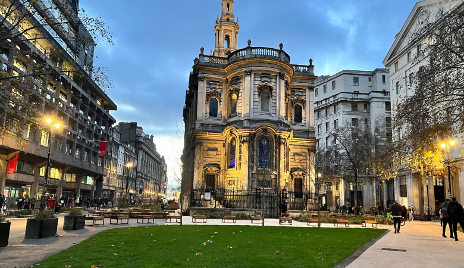
Figure 1 : Pedestrianisation of the Strand-Aldwych has created London's largest new public space for a decade
The £22m Strand-Aldwych redevelopment (Fig. 1) has transformed one of the capital’s most congested and polluted streets into a green and tranquil space the size of a football pitch for King’s and the community to enjoy. King’s colleagues were involved in the co-design process with partners including Somerset House Trust, Courtauld Institute of Art, Northbank BID and Westminster City Council. The new space provides opportunities for education and informal learning for students and local communities and visitors, while facilitating closer relationships between cultural neighbours and partners across Westminster. This builds on our new landmark 10-year strategic relationship with The Courtauld Institute to achieve educational, intellectual and public benefits together.
The Centre for Urban Science and Progress (CUSP) London , is based at King's bringing together researchers, businesses, local authorities and government agencies to conduct interdisciplinary research and innovation using Data Science in and for London. CUSP formed an urban science partnership with Westminster City Council for the redevelopment of Strand-Aldwych, advising on how King’s could assist and benefit from the pedestrianisation, as well as integrating several MSc student projects in the process.
Social impact
King’s ethos of serving society is demonstrated through King’s Volunteering , which connects students and staff with an organisation or cause to make a positive difference. Our online volunteering platform also enables community organisations to access King’s to enhance the impact of their work.
King’s Service Time supports and enables colleagues to undertake community activity beyond the university. It offers King’s staff up to three days/year to take part in voluntary work for another organisation or volunteering programme.
King’s Global Day of Service on 25 March (to celebrate the day King’s was founded) sees King’s students, staff and alumni come together across the world to volunteer their knowledge, skills and experiences to give back and drive positive change (Fig. 2).
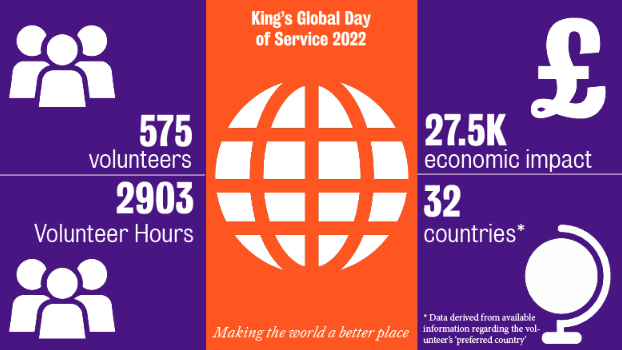
The Legal Clinic is a free, first-tier advice service offering advice on a wide range of legal issues. King’s students work under the supervision of lawyers to provide vital pro bono advice to the public. The Windrush Justice Clinic , is a collaborative partnership made up of community organisations, law centres and university legal advice clinics striving to help victims of the Windrush scandal receive the compensation they deserve. The scheme has directly benefitted the community affected with over 100 clients being assisted to claim Home Office compensation, with 20 being awarded over £1m.
King’s has taken a whole-university approach to forced displacement through our Sanctuary programme to support sanctuary-seekers to rebuild their lives and fulfil their potential through a range of innovative programmes. Kings has worked in partnership to develop the University Sponsorship Model to enable implementation of the UK Government's Homes for Ukraine scheme . This has allowed us to respond to a global issue with local support, becoming recognised by Citizen’s UK as the UK’s first “ Refugees Welcome University .”
King's College London Mathematics School provides high quality maths education to year 12 and 13 students with a particular aptitude and enthusiasm for maths, widening participation in mathematical degrees and careers. The award-winning school runs outreach activities in maths and physics for pupils in years 7 to 13 and supports teachers with a programme of Continuing Professional Development.
King’s experts were among the partners alongside residents, businesses and community groups to develop Lambeth’s Climate Action Plan . The Plan will make Lambeth a cleaner and healthier place to live, work and visit. King’s is also part of the group of high-profile organisations brought together by Lambeth Council in the Climate Partnership Group to lead delivery of the action in sectors ranging from higher education to housing.
The Ortus public café and conferencing space is a hive of activity for local families, researchers and clinicians with the collective goal to improve child and adolescent mental health services. It’s a model of collaboration which has informed the development of the Pears Maudsley Centre for Children and Young People , which similarly brings together King’s College London, South London and Maudsley NHS Foundation Trust, and the Maudsley Charity to accelerate research translation into practical treatments to benefit young people. By involving young service users and their families in the design, we ensured the building provides age-appropriate spaces and works hard to ease anxiety.
As part of the King’s Civic Challenge 21/22 , charity partner Coin Street Community Builders and researchers from the Wellcome/EPSRC Centre for Medical Engineering (CME) worked collaboratively to address a community challenge identified by the charity partner in North Southwark. The project builds social inclusion of isolated and underserved communities in deprived areas locally, rejuvenating a potential revenue stream through gym memberships and skills development with payment for young people through the project.
REACH (Resilience, Ethnicity, and AdolesCent Mental Health) is an ongoing cohort study of adolescent mental health in Southwark and Lambeth. The study is taking place in 12 secondary schools in South London, with over 4,000 Year 7 to 9 pupils invited to take part since 2016. A series of new reports from the study highlight the impact of the COVID-19 pandemic on the mental health of young people in south London.
Aspect 3: Results
An independent economic analysis of King’s research and knowledge exchange activities in 2020-21, showed that King’s generated a total of £2,281m economic impact (Fig. 3) with £274m economic impact in London, and significant impact of £26 million in the south-west of the UK, corresponding to our site in Cornwall. In 2020-21, King’s spinouts secured £245m in equity (Beauhurst & Parkhurst 2022) and approximately £62m of investments have been raised to support King’s start-ups, with 600 jobs created (HE-BCIS, Beauhurst).
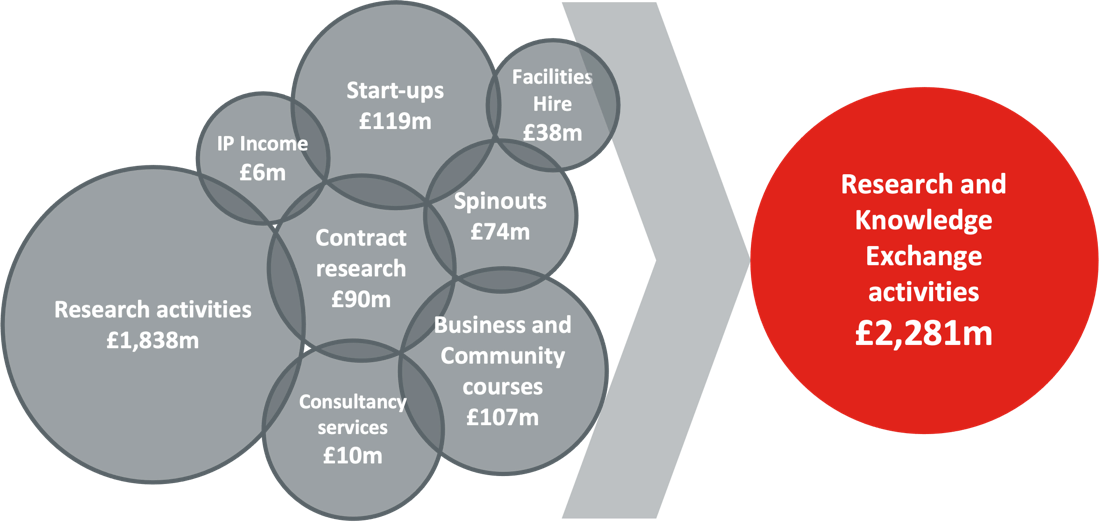
Figure 3: Economic impact of King’s knowledge exchange and research activities 2020-21(London Economics)
King's ranked among the top five UK universities for environmental and social impact in the 2022 THE Impact Rankings . Several of our projects and initiatives have annual impact reports to share outcomes and impact with partner organisations and communities:
The Legal Clinic Annual Report shows the progress made towards the promotion of social justice and provision of free legal advice with positive feedback from students and clients (Fig. 4).
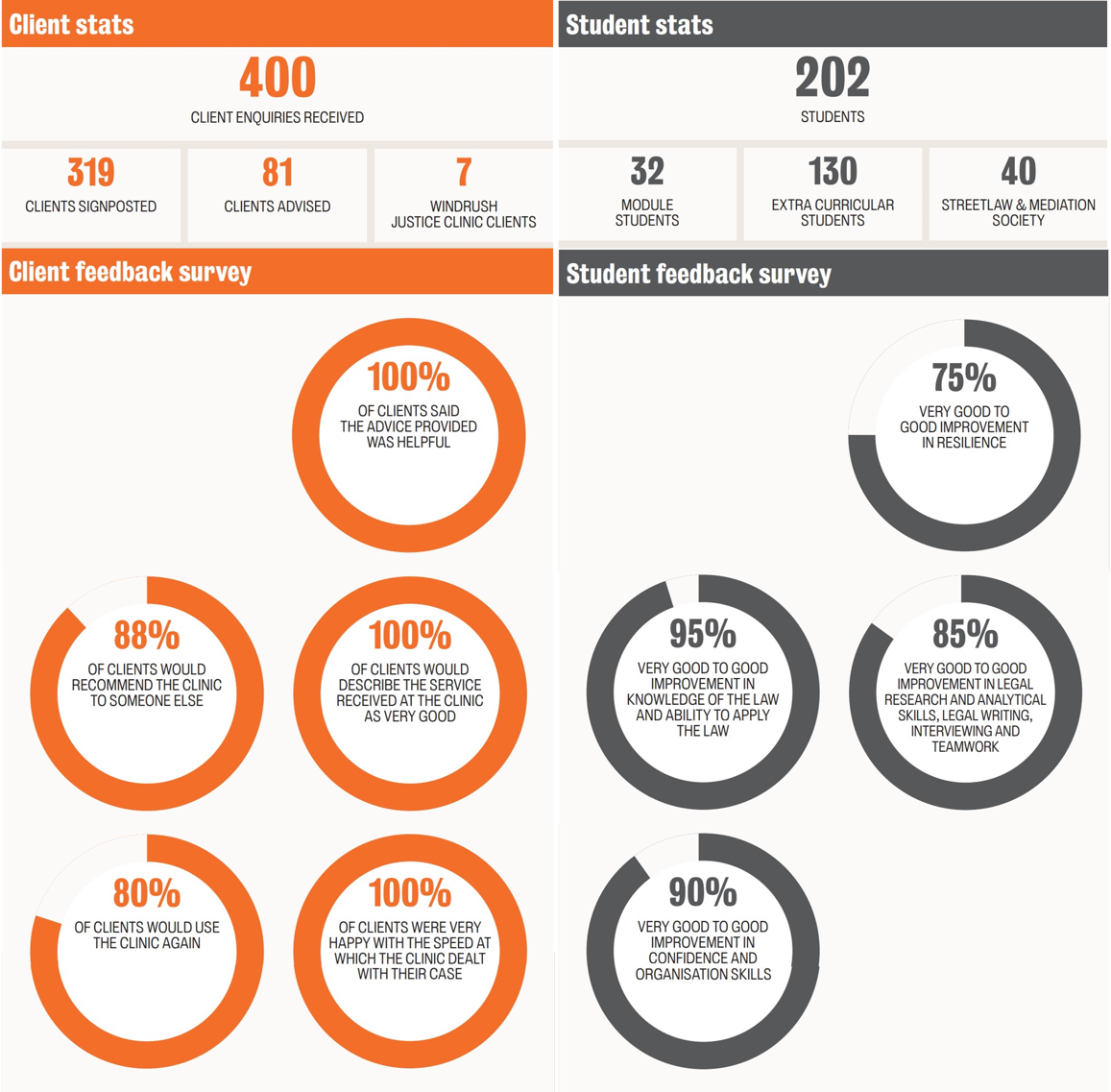
Figure 4: Positive feedback from students & clients using King's Legal Clinic and how it has benefitted them (2021-22)
The King’s Health Partners (Impact report, 2021-22) shows through our partnership with KHP, we have received over £200m investment in our novel technologies, therapeutics, and diagnostics. Targeted support has been implemented to address health inequalities across the six south-east London boroughs for place-based collaborative proposals.
Our Entrepreneurship Institute impact report highlights the success of their activities, including the Cohort VI Ventures’ outcomes following completion of the 12-month King’s20 Accelerator programme (Table 1).
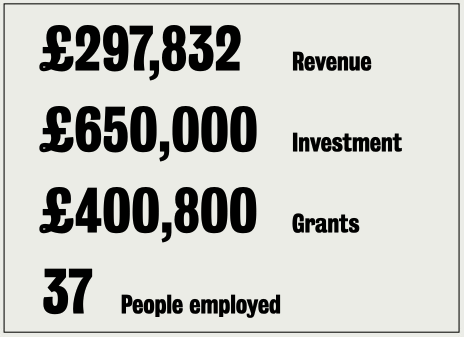
The Health & Social Care Workforce Research Unit Annual Report 2020-2021 outlines the unit’s tremendous contribution to research, policy and practice in health and social care workforce topics during the pandemic. This includes a programme to support day services in South London with new evidence and to develop capacity to improve services: Mapping And Community Engagement.
Most importantly, our local partners value the contribution King’s makes to our partnerships and delivering our mutual goals for our local communities. This value is determined from ongoing feedback we receive via community representation on advisory boards and forums such as:
The CME have established a Community Advisory Forum comprising of community members and organisations based in Lambeth and Southwark. The Forum advise on the new Community Engagement Fund with some members taking part in the review panel to assess submitted proposals.
Our ESRC Centre for Society and Mental Health (CSMH) have developed a Lived Experience Advisory Board (LEAB) to inform the direction of Centre research programmes, consulting on and benefitting specific research projects . Through the NIHR Maudsley BRC we have several service user advisory groups to improve our research by including patient perspectives.
King’s is committed to achieving the UN Sustainable Development Goals and will continue to use our knowledge with purpose to use our expertise for social and economic benefit and to make the world a better place.
Public & Community Engagement
King's Strategic Vision 2029 sets out bold ambitions for the future of King’s as we look towards our 200th anniversary: to make the world a better place through our excellence in education, research and our service to society.
We enhance our impact by building on successful models that integrate Research , Education , Service and engagement. Community engagement is embedded into our degree programmes connecting students and teachers with community partners. We have embedded public and community engagement (P&CE) within our research development pipeline and work alongside communities to respond to issues that they have identified of concern.
Our engagement activities focus on our communities and stakeholders locally, nationally and internationally to inform change across the UK and at a global scale.
Our strategic vision for P&CE with research at King’s is:
“to improve the quality, relevance and impact of King’s research to society through meaningful public and community engagement and involvement.”
We deliver this vision through a set of objectives to build on our existing partnerships, nurture new collaborations to meet the needs of our communities, and become a more open and accessible institution. Our approach was developed with a range of internal and external stakeholders to create a set of principles to ensure we are inclusive, diverse and responsive to the needs of our communities.
Our London location allows King’s to work with its diverse populations (Fig. 1) and we have dedicated pathways to capture their thoughts and views. The way in which we identify and respond to our communities’ needs is included in our Local Growth and Regeneration narrative.
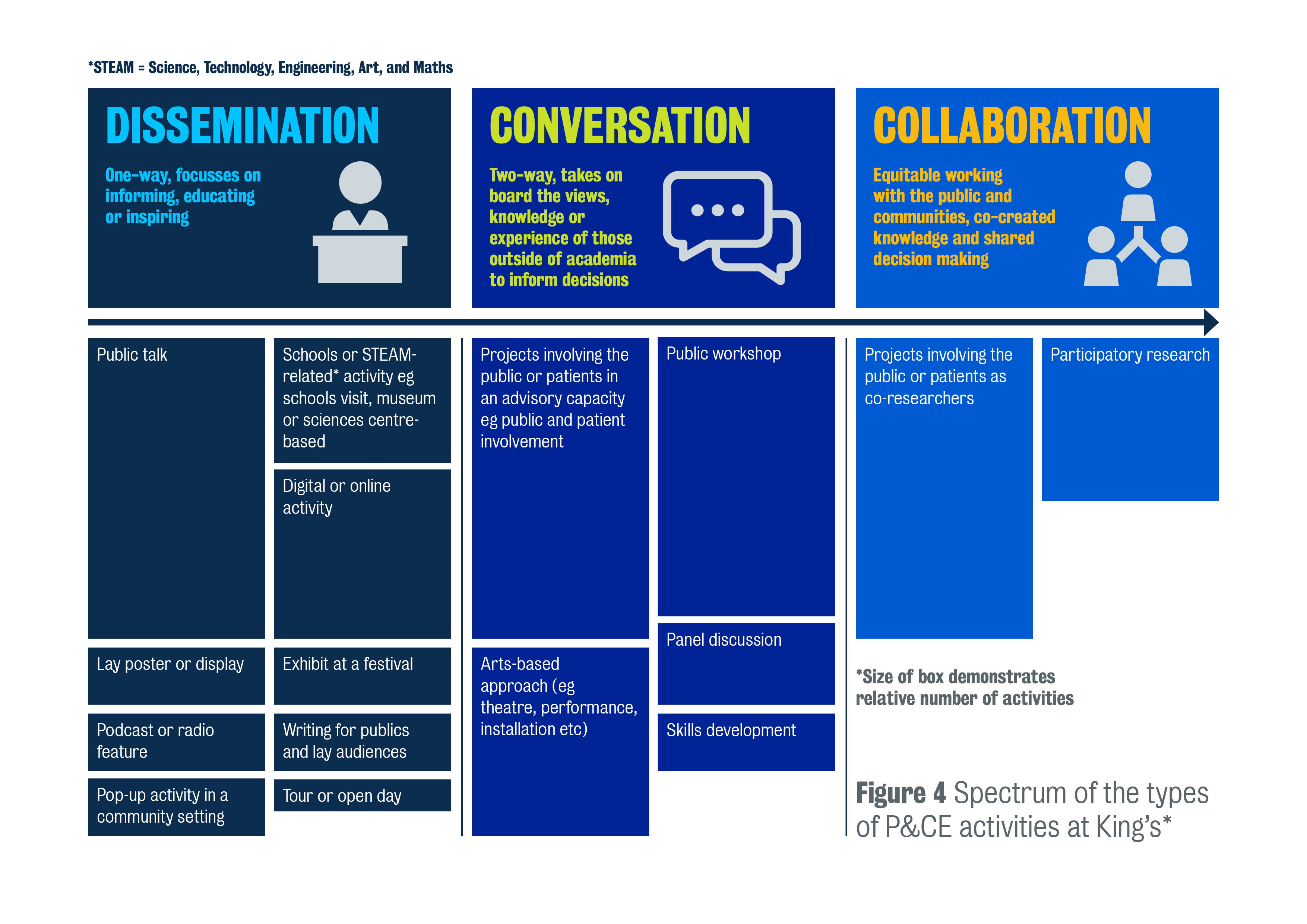
Our first P&CE Objective is to deliver P&CE across our Vision 2029 institutional priorities (outlined in our Institutional context), and build on our strengths in Patient and Public Involvement (PPI) through our NHS Trust Partnerships with King’s Health Partners (KHP), arts and cultural engagement through King’s Culture and policy engagement through the Policy Institute . Our dedication to Service to society and flagship public space, Science Gallery London combined with these strengths gives us a uniquely King’s approach to P&CE.
P&CE utilises the specialised expertise we have in our faculties and directorates, building on the long-term relationships held there, with coordination and support provided centrally (Aspect 2), funded by King’s directly or through the HEIF. Additional value for money is ensured through external investment to allow specialist support for specific programmes and activities. This includes P&CE-specific awards of £840k for the Wellcome/EPSRC Centre for Medical Engineering (CME) and £138k for the ESRC Centre for Society and Mental Health (CSMH).
We have joined up Academic leadership through our Vice President (Research & Innovation), and Vice President (International, Engagement & Service), with further leadership provided by our Dean of Research Impact, working with faculties through their academic leads. Governance is provided through our KE, Innovation and Impact Board which reports directly into our University Executive.
Aspect 2: Support
Advice and consultancy for staff, students and external partners is provided through our P&CE practitioners brokering access to our target groups. Our webpages house resources and case studies and we promote sharing of learning and best practice through networks, seminars and lunch and learn sessions.
Many of our health-focused research centres and studies have a strong engagement component, supported through access to a variety of different PPI, charity and advocacy groups, with which research priorities are identified to co-produce.
A proportion of our activities are arts-based using innovative and creative approaches to engagement. King’s Culture through its Science Gallery London and Strand Cultural Quarter provides gateways to cultural organisations and artists to advance research and learning, engage public audiences and add value to the cultural sector.
Practical Support
P&CE support (Fig. 2) is centrally coordinated and locally delivered to maximise the specialist PPI, cultural, policy and community engagement support we have to meet our P&CE strategic support objective .
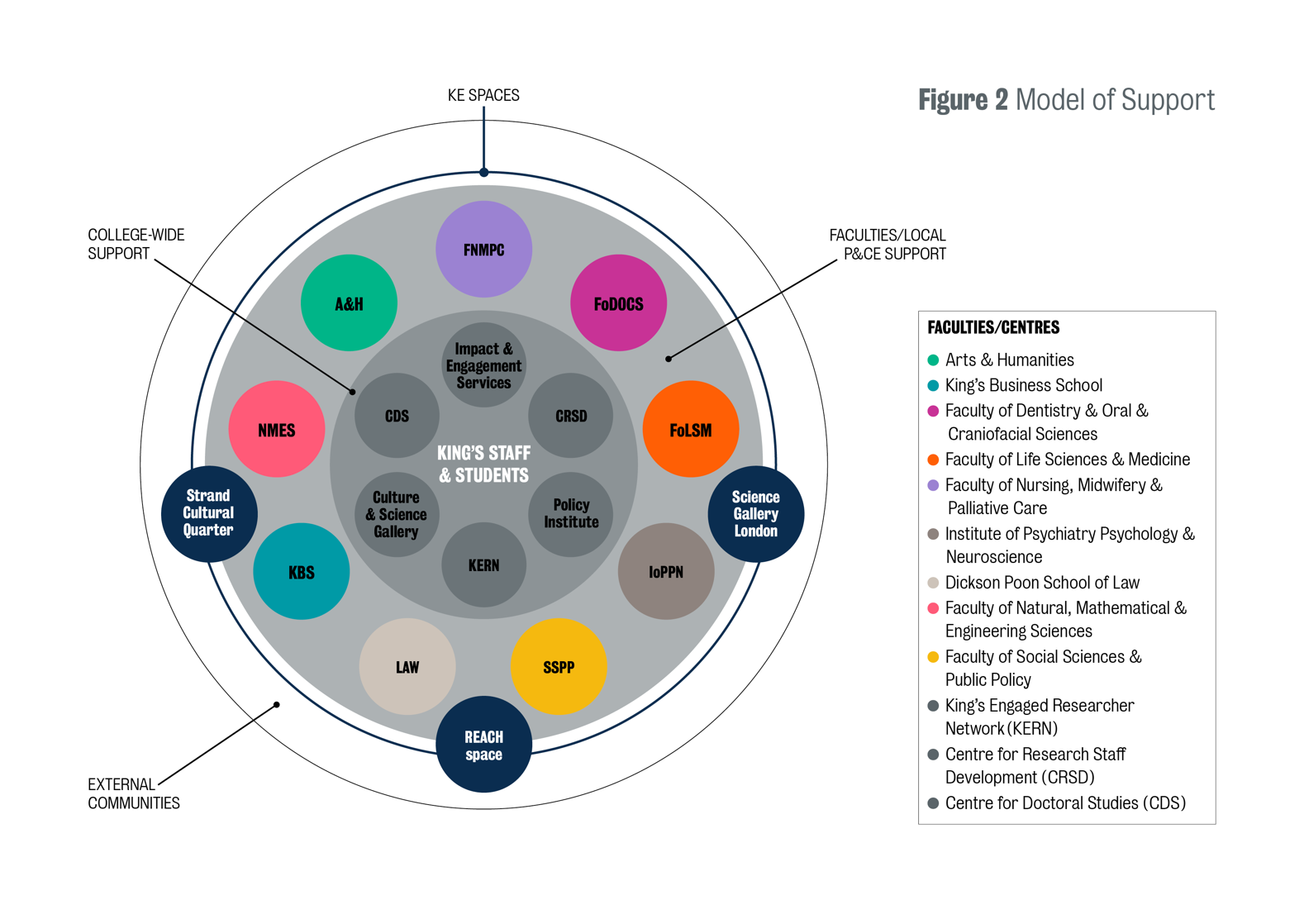
Most support is project-focused and project-funded with a smaller team to provide central coordination and training. This model allows a balance between meeting the needs of a diverse university with providing core skills and support and ensures we work with our partners in a joined-up way across the university. Teams include:
King’s Engaged Researcher Network (KERN) brings together King’s staff and students interested in engaging different audiences. The monthly newsletters reaches >745 subscribers, highlighting funding and training opportunities and sharing best practice. Other networks supporting the delivery of P&CE activities, include the Sustainability Champions and the Race Equality Networks.
Impact & Engagement Services (IES) provides university-wide support to researchers in need of advice and guidance on incorporating high-quality, high-impact public engagement plans into research grant applications (Fig. 3).
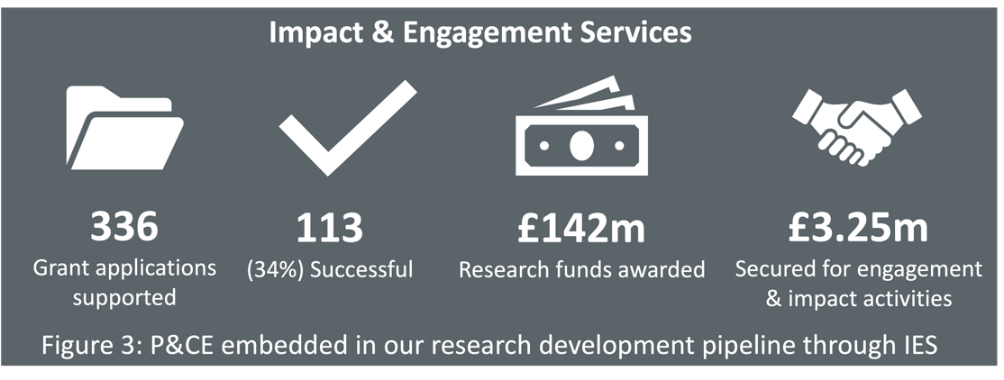
The Policy Institute facilitates engagement between the public, academic, business and policy communities to translate academic research into policy and practice. They run policy labs to provide direct contact with policymakers, providing a valuable opportunity to co-produce responses to complex policy challenges. The approach has been used in many policy areas, including supporting the Independent Review of the Mental Health Act .
Knowledge exchange spaces
We use many parts of our estate to host events and activities with the following dedicated spaces.
The fully-accessible and free-to-visit Science Gallery London showcases work by researchers, students, local communities and artists, hosting free workshops, events and exhibitions. To date it has presented five exhibitions, engaging 200 academics, 3,700 students and welcoming over 150,000 members of the public.
The Strand Cultural Quarter includes the Inigo Rooms, the Exchange, and the Arcade at the Strand campus to support creative learning, showcasing imaginative research collaborations and invites local communities to connect with King’s.
The REACH Space provides a platform for interdisciplinary and external collaborations to explore novel and creative methods, activities and ideas to build more robust and dynamic socially-engaged research.
Skills and training
Skills building and training provision reflects our diverse staff and student needs with beginner to advanced-level training workshops, training on working with particular audiences, podcasts and summer schools. Creative digital skills training has been provided to >1800 students.
KERN Training sessions have been attended by 222 researchers since September 2019. To increase opportunities for learning and sharing of best practice, the KERN has also run a successful Public Engagement at King’s Seminar Series.
King’s has various grants to enable P&CE activity, including:
Small P&CE grants schemes : Over this KEF period the scheme has awarded >£44,000 to 55 activities (30 staff and 25 research students).
Artist in Residence Schemes: Awarded >£70,000 for £ £5,000 of seed-funding to potential artist-researcher teams to connect, develop and test ideas.
Reward & Recognition
Our academic performance frameworks include ‘Knowledge Dissemination and Impact’. P&CE has contributed to academic promotions and we appointed a Professor of Practice in Public Understanding of Mental Health Research in 2022.
Several faculties and directorates have P&CE and impact awards .
BRC in the Community : is an annual event run by the NIHR Maudsley Biomedical Research Centre (BRC) to showcase and celebrate collaborations between the Centre and its’ community.
Two of our seven principles for P&CE focus on EDI to ensure our offer is sensitive to the needs of our diverse communities. Examples of EDI embedded in P&CE include:
King’s partner NIHR Applied Research Collaboration (ARC) South London
Healthy Eating & Active Lifestyles for Diabetes (‘ HEAL-D ’) is a co-produced culturally tailored diabetes self-management programme for adults of African and Caribbean heritage.
Aspect 3: Activity
A wide breadth and depth of activities are undertaken to meet the needs of our diverse London audience and fulfil the range of purposes our activities have. These activities cover the full spectrum of P&CE (Fig. 4), ranging from one-off activities and citizen science through to co-creation with long-standing partners resulting in policy change and impactful research .
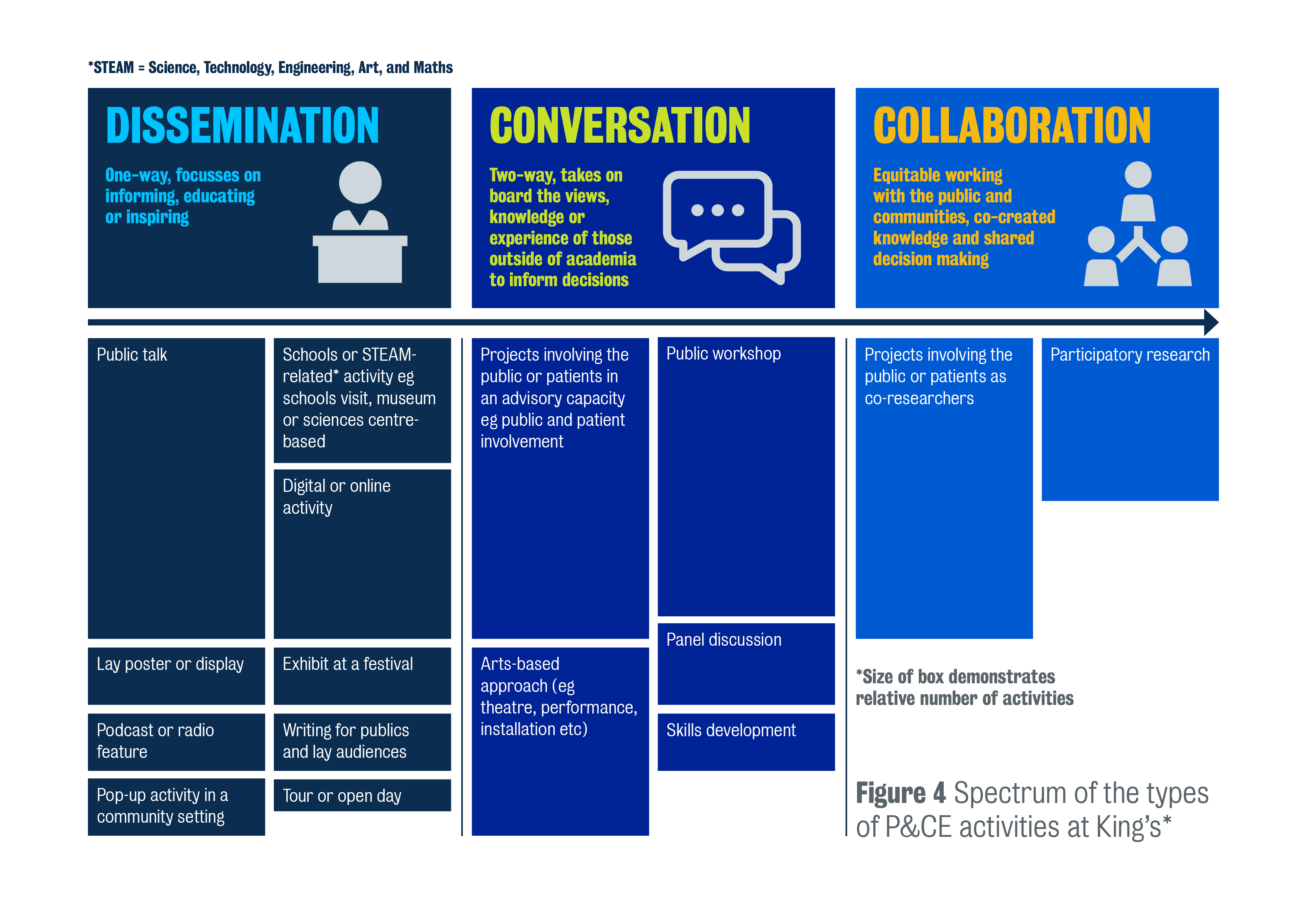
We deliver activities for a range of outcomes (Fig. 5), using critical reflection to enhance our practice and ensuring we meet our strategic P&CE objective , “to meet the different needs of our communities internally and externally.”
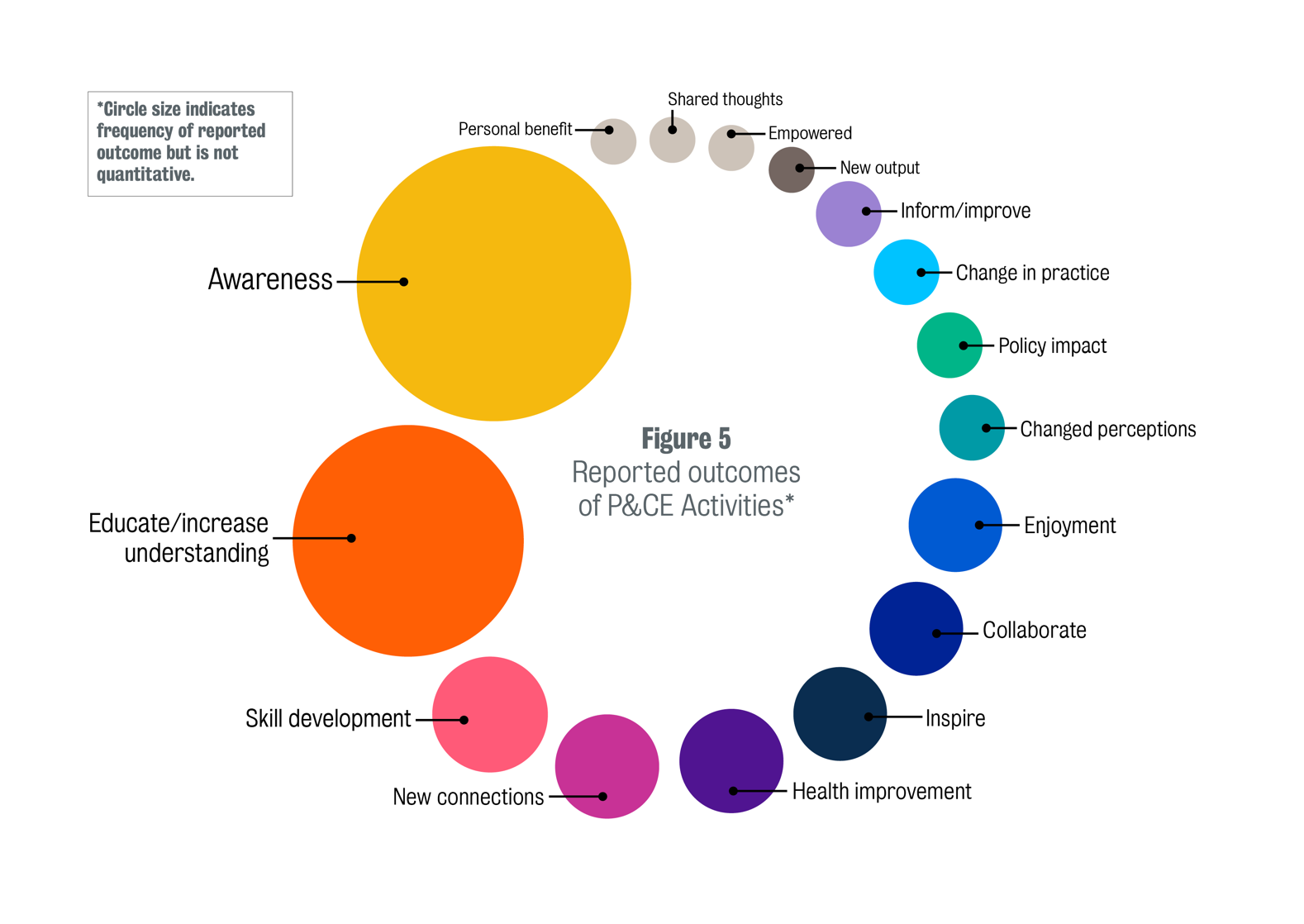
Our engagement activities focus on our communities and stakeholders locally, nationally and internationally in-accordance with our P&CE objective to “ Build on and nurture our existing expertise and utilise our long-term partnerships with local, national and international communities and organisations ,” as shown in the examples below:
Dental students run The Smile Society to raise oral health awareness, including creating online workshops and educational videos to successfully engage local primary school children and charity partners during pandemic lockdowns.
The Department of Physics and the London Institute for Advanced Light Technologies (LIALT) hosted Guiding Lights to celebrate the International Day of Light using the exhibition and workshops in academic-artist partnership to advance light technologies knowledge and share this knowledge with each other and the public.
The Children and Young People’s Health Partnership ( CYPHP ) developed, implemented, evaluated, and embedded a new model of integrated healthcare for local children and young people. The new partnership and evaluation approach has improved health care delivery for 128,000 children and young people living in Southwark and Lambeth.
Research on the whether faecal microbiota transplants can treat antimicrobial resistant infections in liver disease patients resulted in collaborations with creative artists to produce animations , videos , podcasts and a policy event at the Houses of Parliament.
A project using art to portray the lived experiences of women with gestational diabetes . Feedback was positive; patients felt understood and clinicians re-evaluated their practice.
The Dark Matter exhibition attracted over 37,000 visitors in London and Dublin and inspired a film which uses Dark Matter as a metaphor for the marginalisation of black women in society.
Meaning and Purpose Network is a growing network of medium-large employers and King’s scholars aiming to create ethical, inclusive and sustainable futures for organisations through knowledge sharing via workshops and podcasts resulting in case studies and thought piece articles.
A co-production workshop on palliative care was attended by patient, public, family/carer representatives and researchers to get input on the association of socio-economic position with deaths at home. The workshop allowed patients’ voices to be built into a national report , published in July 2022, which received positive feedback from service providers and policymakers.
Our research has contributed to raising awareness for better accountability and evaluation practices centred on young people and their needs. Valuing Youth work undertook extensive engagement with young people, youth workers and policy makers/influencers to produce two briefings with messages for decision makers and practical resources for youth workers .
International
Radical Translations used workshops, film and performance to develop new, collaborative approaches to translation and performance through civic associations/individuals/community groups interested in the history of revolution/political radicalism. Outputs included the Radical Translations Toolkit : a resource for anyone engaged in the process of translating radical ideas today.
Together to Transform united academics, practitioners and lived experience advocates from different disciplinary and geographic backgrounds. It involved 39 participants from 24 countries using a mutual learning process to develop a social paradigm of mental health in equal partnership with our global community partners.
A panel discussion and public workshops through the United National Development Programme on inclusive innovation in Southeast Asia resulted in a series of policy recommendations and an UNDP report .
We held a knowledge exchange workshop involving academics, legal practitioners and policy-makers on governing the clean energy transition resulting in a report and policy briefing .
Aspect 4: Enhancing practice
Our P&CE objectives include: “To build monitoring and evaluation into our activities with opportunities to reflect on, learn and improve our practice.”
This is supported institutionally through our Research Impact leads and IES teams and the KERN providing guidance and training on providing guidance on evaluation methods which can be tailored to individual projects. Currently, measures of success focus on grant capture for impact and engagement activities (Fig. 3) though this is being revised to create a monitoring and evaluation framework representing the breadth of KE, Innovation and Impact activities at King’s.
We aim to embed evaluation into all engagement activities. Methods include questionnaires, testimonies, feedback forms, self-reflections, and monitoring and evaluation frameworks. Some examples include:
Evaluations of the major programmes coordinated by King’s Culture include Somerset House Studios, and Inside Art and Science; and the On Edge Season at Science Gallery London.
King’s Civic Leadership Academy connects students with local community organisations to enhance civic services and develop students’ leadership skills and employability outcomes. The What Works Department developed a theory of change and research protocols to evaluate the impact of the programme. Experiences are shared publicly through blogs and we will share learnings and expand this to other areas across the university.
The Health Inequalities Research Network (HERON) is a Wellcome Trust-funded research and public engagement network. Research is co-produced with local and national partners including community organisations, researchers and healthcare practitioners to reduce inequalities in mental health and healthcare. Public engagement activities span multiple formats of engagement producing resources for physical activity, research methods training, and evaluation work.
We have several Centres of Research Excellence which have pioneered innovative approaches to monitoring and evaluation which we will incorporate into our institutional offering. The CME has successfully embedded P&CE into their research, with a P&CE strategy, advisory board and evaluation framework . Individual projects are evaluated and training provided for evaluation and impact. The Learning – Evaluation – Action Programme (LEAP) was a pilot consisting of online training and experience-based learning to build evaluation capacity and ensure that evaluation becomes embedded in P&CE activities. Following training students took on the role of evaluation consultant to a King’s P&CE project, delivering an output based on their client’s brief.
King’s has several valuable lived experience groups to improve the quality and relevance of our research, whilst benefiting the peer researchers involved. Our Mental Health and Justice project involved collaboration with service users, clinicians, policy makers and third sector organisations resulting in specific recommendations to shape the Independent Review of the Mental Health Act , to enable patients to plan for their own care and treatment. King’s researchers produced a policy briefing and worked with policymakers to ensure the recommendations were incorporated into the draft Mental Health Act Reform Bill 2022 .
Aspect 5: Building on success
Our goals in this KEF period were to continue to enhance P&CE, strengthen senior leadership and adopt a more strategic direction. Our revised academic leadership and governance are outlined in Aspect 1.
Our strategic approach has been informed by ongoing consultation with our internal and external communities . Our central IES provision was recently externally evaluated to determine outcomes, successes, challenges and lessons learnt from the five years since the team was created and identified what does and does not work, and is influencing our ongoing provision.
King’s held our inaugural Impact and Community Engagement summer school in 2022. Following positive feedback we repeated the summer school for 2023, building on the evaluation outcomes and insights from our Research England Participatory Research fund (2021-22) to develop a two-year programme of support for Participatory Research.
Shared learning is common across King’s with events held by project teams, departments, Centres and institutionally through the KERN. A variety of reports are written, either for internal committees and audiences, or external reporting to funders and partners for specific projects and programmes .
We have outlined areas for collaboration and mutual priorities with our local boroughs, enabling King’s to work together with our local communities and residents to co-create solutions to shared problems and challenges.
Publics and communities’ involvement are included in advisory groups / boards for our Centres and strategic programmes and is integral to help us achieve our objective to, “become a more open and accessible institution for our external communities.”
Our final objective is, “To communicate our successes with our internal and external communities, sharing best practice and celebrating our mutual achievements.” This is achieved through social media (@KingsEngages, @KingsCollegeLondon, @ServiceatKings), webpages , BBC radio programmes 39 ways to save the planet and Bound to the mast , and networks .
Institutional evaluation of our P&CE provision has been ongoing since 2013 using the NCCPE EDGE tool and has shaped the priorities in our strategic approach.
Note You are currently viewing the latest version of this narrative statement. View the previous version as published in previous iterations of the KEF (KEF1 and KEF2)
We have 37 King’s College London PhD Projects, Programmes & Scholarships
All disciplines
All locations
Institution
King’s College London
All PhD Types
All Funding
King’s College London PhD Projects, Programmes & Scholarships
A digital twin of chronic thromboembolic pulmonary hypertension to predict patient outcomes, phd research project.
PhD Research Projects are advertised opportunities to examine a pre-defined topic or answer a stated research question. Some projects may also provide scope for you to propose your own ideas and approaches.
Funded PhD Project (Students Worldwide)
This project has funding attached, subject to eligibility criteria. Applications for the project are welcome from all suitably qualified candidates, but its funding may be restricted to a limited set of nationalities. You should check the project and department details for more information.
PhD studentships in Quantum Technologies, King’s College London
Funded phd programme (students worldwide).
Some or all of the PhD opportunities in this programme have funding attached. Applications for this programme are welcome from suitably qualified candidates worldwide. Funding may only be available to a limited set of nationalities and you should read the full programme details for further information.
4 Year PhD Programme
4 Year PhD Programmes are extended PhD opportunities that involve more training and preparation. You will usually complete taught courses in your first year (sometimes equivalent to a Masters in your subject) before choosing and proposing your research project. You will then research and submit your thesis in the normal way.
Gene regulation in human development
Self-funded phd students only.
This project does not have funding attached. You will need to have your own means of paying fees and living costs and / or seek separate funding from student finance, charities or trusts.
PhD studies in mental health, substance use disorders, multimorbidity, health services research (nursing, pharmacy, allied or public health focus)
The PhD opportunities on this programme do not have funding attached. You will need to have your own means of paying fees and living costs and / or seek separate funding from student finance, charities or trusts.
PhD Research Programme
PhD Research Programmes present a range of research opportunities shaped by a university’s particular expertise, facilities and resources. You will usually identify a suitable topic for your PhD and propose your own project. Additional training and development opportunities may also be offered as part of your programme.
Robotic systems for precision automation
Manipulation of the polarization in ultrathin ferroelectrics, fe-cfd modelling of coupled coolant flow-heat transfer-thermomechanical stress-hydrogen embrittlement in hybrid thermal protection systems for hypersonic scramjet combustion engines, investigate cytoskeletal networks controlling cancer cell migration at the systems level., phd cognitive function and balance in bronchiectasis, phd digital health in bronchiectasis, full scholarship at epsrc cdt in advanced engineering for personalised surgery & intervention, epsrc centre for doctoral training.
EPSRC Centres for Doctoral Training conduct research and training in priority areas funded by the UK Engineering and Physical Sciences Research Council. Potential PhD topics are usually defined in advance. Students may receive additional training and development opportunities as part of their programme.

Humanities Research Programme
Humanities Research Programmes present a range of research opportunities, shaped by a university’s particular expertise, facilities and resources. You will usually identify a suitable topic for your PhD and propose your own project. Additional training and development opportunities may also be offered as part of your programme.
German PhD (option of joint PhD with Stuttgart or Humboldt University)
History phd (option of joint phd with hong kong university or national university of singapore), music phd (option of joint phd with hong kong university), arts research programme.
Arts Research Programmes present a range of research opportunities, shaped by a university’s particular expertise, facilities and resources. You will usually identify a suitable topic for your PhD and propose your own project. Additional training and development opportunities may also be offered as part of your programme.
FindAPhD. Copyright 2005-2024 All rights reserved.
Unknown ( change )
Have you got time to answer some quick questions about PhD study?
Select your nearest city
You haven’t completed your profile yet. To get the most out of FindAPhD, finish your profile and receive these benefits:
- Monthly chance to win one of ten £10 Amazon vouchers ; winners will be notified every month.*
- The latest PhD projects delivered straight to your inbox
- Access to our £6,000 scholarship competition
- Weekly newsletter with funding opportunities, research proposal tips and much more
- Early access to our physical and virtual postgraduate study fairs
Or begin browsing FindAPhD.com
or begin browsing FindAPhD.com
*Offer only available for the duration of your active subscription, and subject to change. You MUST claim your prize within 72 hours, if not we will redraw.

Do you want hassle-free information and advice?
Create your FindAPhD account and sign up to our newsletter:
- Find out about funding opportunities and application tips
- Receive weekly advice, student stories and the latest PhD news
- Hear about our upcoming study fairs
- Save your favourite projects, track enquiries and get personalised subject updates

Create your account
Looking to list your PhD opportunities? Log in here .
Filtering Results

- Skip to main content
- Skip to footer

- Student Services Online
- Type to search Student Services Online
I am sponsored for my tuition fees; what do I need to know?
What's the difference in meaning between being self-funded or sponsored?
King's College London will consider you to be a ‘sponsored ’ student where your tuition fees are being paid to King’s College London directly from an external organisation. You will be considered to be a ‘ self-funded’ student where;
- your tuition fees are being paid directly to King’s College London by either you, a member of your family or a friend
- where you are receiving funding towards your tuition fees and the funding is being paid to you directly , rather than to King’s College London, then you are considered to be self-funded.
There is a slightly different process you’ll need to follow if you are sponsored or self-funded. For more details, please refer to our article Paying your tuition fees at King’s . If you have any other questions about your fees please check out these FAQs as they are a great source of information. Important to know: Please be aware that funding from a friend or family member is not classified as sponsorship.
Key things to know about the sponsorship process
- At the first stage of your enrolment, which is an online ‘enrolment task’, you will be asked to provide the details of your sponsor.
- Most students will need to supply the Financial Support Letter confirming the funding from their sponsor, including the amount.
Sponsorship documents should be uploaded when you complete the online enrolment task, which you need to do as part of the overall enrolment process for new students or re-enrolment process for returning students . If you've already completed the task this year, they can also be submitted using the links below:
- Undergraduate and postgraduate taught students (excluding Florence Nightingale Faculty of Nursing, Midwifery & Palliative Care) – complete this form
- Undergraduate and postgraduate taught students in the Florence Nightingale Faculty of Nursing, Midwifery & Palliative Care (NMPC) – send documents by email
- Postgraduate research students (excluding Institute of Psychiatry, Psychology & Neuroscience) – complete this form
- Postgraduate research students in the Institute of Psychiatry, Psychology & Neuroscience (IoPPN) – send documents by email
- You will need to re-enrol and supply this sponsorship information each year of your course.
- There are a wide variety of organisations which provide sponsorship, so the exact requirements needed will vary.
- The Credit Control department can support you with all queries related to your sponsor letter, invoicing and payment.
For more details on the sponsorship process and what you need to know, including:
- What evidence to supply
- When and how to supply evidence
- When and how sponsors should make payments
Please visit Are your tuition fees funded by a sponsor? Sponsorship requirements For many sponsors, you can follow the general guidance which is outlined in the above. However, there are some sponsors with specific requirements, so it’s important you know how things work for your particular sponsor if they fall within this list of sponsorship requirements . If you have any other questions about your fees please check out these FAQs as they are a great source of information.
My sponsor is paying my tuition fees, what do I need to do?
It is important that you can provide us with proof that a third party is sponsoring you, otherwise you will be liable for all tuition fees. Important to know: If you are in receipt of a loan from Student Finance then you will not need to provide documentation because we will confirm this directly with Student Finance. If you are receiving support from other sponsors then you should upload any sponsorship documents during your initial application to King’s. This information will be added to your record to ensure your sponsor is sent the invoices.
My sponsor is asking for confirmation of enrolment and fees
Confirming enrolment If you are a new student , your enrolment is a two-stage process; first you have an online enrolment task, and second you attend an appointment in person and receive your student ID card. Once your enrolment is complete, you will be able to access and download your Confirmation of Study letter which confirms your enrolment status and the details of your course. If you are a returning student , you need to re-enrol through your online enrolment task at the start of each academic year. Once you have done that you be able to access and download your Confirmation of Study letter for the new academic year. Confirming fees Your sponsor will be invoiced directly with all the details of fees due, payment deadlines and methods of payment. If your sponsor is asking for confirmation of your fees before the invoice will be issued, you can provide them with your Offer letter which states your fees. If your sponsor is asking for more than the Confirmation of Study letter and Offer letter, you or your sponsor can contact Credit Control directly for support.
My sponsor is asking for confirmation of enrolment and fees before they will provide their financial support letter
If your sponsor is asking for confirmation of enrolment and fees before they'll provide you with their financial support letter confirming the sponsorship, your options are:
- Explain to your sponsor you ideally need evidence of their support to complete your enrolment
- Show your sponsor this article as guidance
- Contact Student Admin Services as they're best placed to support you and your sponsor
- Once you've got your letter confirming your financial support from your sponsor, you can send this directly to Student Admin Services .
Important to know:
- Evidence of your sponsorship should be provided as soon as possible following your enrolment if you've been unable to provide prior to enrolment.
- If no evidence has been supplied by the time invoices are created, you'll be invoiced directly. Invoices are usually issued each year in late October/early November.
If you have any other questions about your fees please check out these FAQs as they are a great source of information.
If you are a distance learning student doing a course through King's Online, through process for payments is slightly different; please refer to King's Online Distance Learning Fees .
Related Articles (3)
Sponsorship Guidance
Evaluating Community Sponsorship in the UK: Building constructive social relationships between refugee families, Sponsorship Groups and wider communities
- Ansems De Vries, Leonie (Primary Investigator)
- War Studies
Project : Research
Project Details
| Status | Finished |
|---|---|
| Effective start/end date | 1/07/2020 → 31/05/2021 |
- Reset Communities and Refugees: £6,000.00
Browser does not support script.

Refugees Welcome: Community Sponsorship as a pathway to refugee protection in the UK
Dr leonie ansems de vries.
Senior Lecturer in International Relations, Department of War Studies
16 June 2020
- International
King’s, in collaboration with local and international partners, is spearheading an innovative refugee community sponsorship project that will offer a small-scale yet impactful response to the issue of forced displacement, through the resettlement of a refugee student and their family to the UK.
In recent months people’s movements have been severely restricted in response to the Covid-19 pandemic, in ways that might have been unimaginable a few months earlier. In the UK, travel restrictions have led to a sharp decline in asylum applications, with Europe recording the lowest level of asylum applications for over a decade . Yet, this does not indicate a fall in the number of people who are forcefully displaced; rather, more people are stuck in countries of origin and spaces of transit en route , often without adequate access to essential services.
Refugee resettlement is one safe and legal pathway to protection for people in search of safety. In recent years, the issue of forced migration in Europe has often been described in terms of a ‘migration crisis’. This is a problematic narrative as it suggests that migration, or the arrival of people in Europe, is itself a problem. Moreover, by locating the issue in Europe, a wider geography and history of mobility including Europe’s violent engagements in other parts of the world, is cut off from the frame of analysis.
The proliferation of borders
The problem is not movement as such – people move all the time, or at least we did before the Covid-19 pandemic, the problem is that, due to the proliferation of borders , people in search of safety often have no access to legal routes to safety. One of the reasons that so many people embark on irregular, costly and dangerous journeys is that there are very few visas for people travelling on humanitarian grounds such as fleeing conflict, persecution, poverty or other conditions that endanger their lives.
A serious rethinking of the border regime is required to ensure that people on the move do not become illegalised – that is, have to resort to irregular and often dangerous journeys. Making legal pathways more accessible to people who need them most and increasing their capacity is one step in the right direction. As a refugee resettlement pathway, community sponsorship supports this effort.
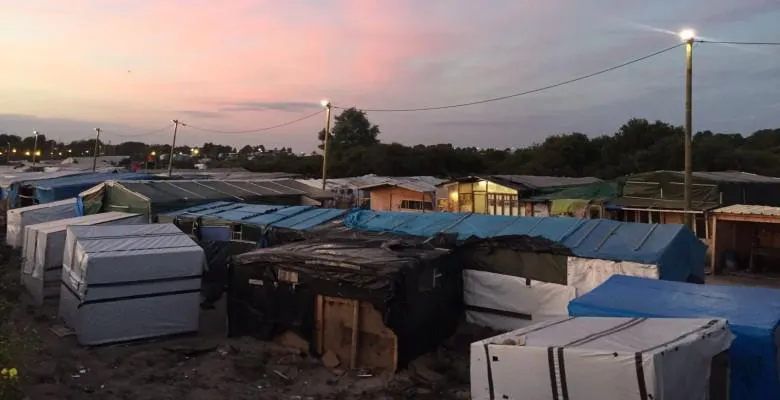
Community Sponsorship in the UK
The UK refugee community sponsorship scheme enables community organisations to sponsor a refugee family brought to the UK through the United Nations Refugee Agency (UNHCR) resettlement scheme and to support them in settling in their local area. In the past two years, King’s has worked together with Citizens UK, the UK Home Office, the UNHCR and international partners to further develop this scheme by adding an education pathway. This project is led by Professor Bronwyn Parry and myself.
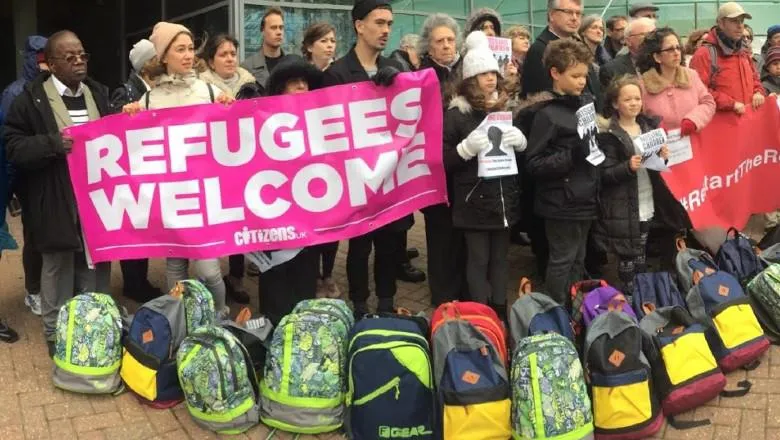
King’s is a ‘Refugees Welcome University’
King’s will become the sponsoring community for a refugee student and their family. We will provide the family with structured all-round support and a fully-funded undergraduate scholarship to enable the student to further their education. This is a community effort, facilitated by an institutional partnership between King’s and Citizens UK, and involving a dedicated team of staff and students from across the university, who will offer day-to-day support as well as professional advice on education, employment, healthcare and welfare. A student buddy from KCL Student Action for Refugees (KCL STAR) will offer peer support for the refugee student. It is also a community-building process for King’s, bringing together staff and students, and working closely with refugee communities, to create positive change.
Due to the Covid-19 pandemic, the UNHCR resettlement scheme has been temporarily suspended , causing a delay in the implementation of this novel community sponsorship scheme. We have continued our preparations, creating a safe, welcoming and supportive structure, and we hope to welcome a refugee family to King’s later this year.
Find out more about how King’s is contributing to understanding and responding to the global issue of forced displacement and helping to realise the educational potential of refugees on the King’s Sanctuary Programme webpage .
In this story

Leonie Ansems de Vries
Reader in International Politics
Latest news

30 August 2024
King's alumna Errollyn Wallen appointed Master of the King's Music
Errollyn Wallen CBE, who studied composition at King’s, is the first Black woman to become Master of…

Dulled emotional reactions in individuals with anhedonia linked with prolonged activity of the brain's attentional networks.
Anhedonia-related emotional blunting is linked with abnormally sustained activity in brain areas…

New Vice Dean International appointed
Dr Julia Philippou to assume new role from 2 September 2024.

New Director of Cicely Saunders Institute appointed
Professor Catherine Evans to assume new role from 2 September 2024.

IMAGES
VIDEO
COMMENTS
Procedure for requesting research sponsorship. Please read the latest sponsorship guidance. Sponsorship Guide (Non-CTIMP) (37).zip. ... If your study is sponsored by King's College London and/or South London and Maudsley NHS FT, your Research Governance Facilitator will complete local checks and confirm that South London and Maudsley NHS FT has ...
The University Sponsorship Model is a cross-sector collaborative widening participation initiative that provides a safe route to the UK, and access to Higher Education and support to thrive for forcibly displaced students and academics. King's College London piloted university sponsorship in 2021 and expanded the initiative in response to the ...
The war in Ukraine has seen over eight million people forced to flee their homes and seek sanctuary across Europe. To support displaced students and academics, King's College London has worked in partnership to develop the University Sponsorship Model with Citizens UK, Ukrainian Sponsorship Pathway UK (USPUK), Open University, Newcastle University and the University of Leicester.
Welcome to the King's College London Research Portal. 35129 Profiles. 268 Research units. 199937 Research output. 29501 Projects. 7003 Student theses.
King's is a world-leading university dedicated to finding solutions to urgent global challenges through our teaching, research and collective impact. A civic university at the heart of London, we have five main campuses across the capital, with three co-located alongside major NHS hospitals, together with sites in Oxfordshire and Cornwall .
Institutional Sponsorship 2016. Mottershead, Chris (Primary Investigator) Project: Research. ... Status: Finished: Effective start/end date: 1/07/2016 → 31/03/2017: Funding. EPSRC Engineering and Physical Sciences Research Council: £1,045.00; View all. ... King's College London data protection policy.
King's College London (informally King's or KCL) is a public research university located in London, England.King's was established by royal charter in 1829 under the patronage of King George IV and the Duke of Wellington. [9] [10] In 1836, King's became one of the two founding colleges of the University of London. [11]It is one of the oldest university-level institutions in England.
King's College London welcomes students from over 150 countries around the world and the requirements and business processes for each sponsor can vary considerably. If your tuition fees are being paid to King's College London, by any of the specific sponsors below, then please familiarise yourself with the requirements so that we are able to ...
King's College London Faculty of Life Sciences & Medicine. Applications are invited for a 3.5-year PhD studentship centred around development of digital twins in pulmonary hypertension, a condition with a high unmet clinical therapeutic need. Read more. Supervisor: Dr CM McCabe. 22 August 2024 PhD Research Project Funded PhD Project (UK ...
Key things to know about the sponsorship process At the first stage of your enrolment, which is an online 'enrolment task', you will be asked to provide the details of your sponsor. Most students will need to supply the Financial Support Letter confirming the funding from their sponsor, including the amount.
Find 49916 researchers and browse 205 departments, publications, full-texts, contact details and general information related to King's College London | London, United Kingdom | KCL
Our enquiry-driven research delivers transformative insights with the power to advance and accelerate global progress. We work across disciplines and collaborate with partners so that our research changes practice and influences understanding at home and abroad. The 2021 REF confirmed King's place as one of the UK's top research universities.
EPSRC Global Challenges Research Fund Institutional Sponsorship Award 2016. Richards, David (Primary Investigator) Physics; Project: Research. ... Status: Finished: Effective start/end date: 1/06/2016 → 31/03/2017: Funding. EPSRC Engineering and Physical Sciences Research Council: £61,565.00; View all. ... King's College London data ...
Sponsorship Guidance. Download. File Type: docx Contact us; Careers; Site map; Accessibility statement; Our Hospitals. King's College Hospital Denmark Hill London SE5 9RS Phone: 020 3299 9000. Princess Royal University Hospital (PRUH) Farnborough Common Orpington Kent BR6 8ND Phone: 01689 863000. ... ©2024 King's College Hospital NHS ...
With funding of up to 40,000 EUR from TU Dresden and 20,000 GBP from King's College London, the focus is on areas such as cancer research, neuroscience, electrical and computer engineering, materials science, metabolic diseases, psychiatry & psychology, and mathematics.
A64-1: Sponsor Rahman Ahmed Research & Innovation Governance Manager Kings College Hospital NHS Foundation Trust 161 Denmark Hill, LONDON, SE5 8EF. Tel: 020 3299 6625 e-mail: [email protected] Professor Robert Lechler Vice Principal (Health) Counting House Guys Campus Kings College London SE1 4UL Tel: 0207 188 8794
King's welcomes students with a range of qualifications from all over the world. Entry requirements vary for each course and are listed on our postgraduate research course pages.. Please make sure that you fulfil all the entrance requirements for the course to which you are applying, including English language requirements if relevant. Competition for places on some courses is extremely high ...
About. The Clinical Research at King's College London is a multi-disciplinary course aimed at practitioners who wish to develop their clinical or academic research careers. The course seeks to enhance the skills and knowledge needed for supporting, delivering and integrating research into clinical practice, as well as fostering evidence-based ...
Research output; Projects; Student theses; Activities; Datasets; Impacts; Prizes; Search by expertise, name or affiliation. Evaluating Community Sponsorship in the UK: Building constructive social relationships between refugee families, Sponsorship Groups and wider communities. Ansems De Vries, ... King's College London data protection policy.
Collaborate with King's Navigation link in category Research & Innovation. Press escape key to return to main menu; King's Health Partners Navigation link in category Research & Innovation. Press escape key to return to main menu ... King's College London Strand London WC2R 2LS United Kingdom.
Sponsored students. Undergraduate, overseas and postgraduate students will be classified as a ' sponsored ' student where your tuition fees are being paid to King's College London directly from an external organisation. Please Note: a family member/friend does not count as a sponsor and you will be recorded as a self-funded student.
A civic university at the heart of London. King's Vision 2029 sets out our ambition to be a civic university at the heart of London, working in partnership to contribute to the success of the city in which we make our home.. Through London, students connect their learning with real-world challenges while developing new insights, networks and skills.
King's is spearheading an innovative refugee community sponsorship project. Community Sponsorship in the UK . The UK refugee community sponsorship scheme enables community organisations to sponsor a refugee family brought to the UK through the United Nations Refugee Agency (UNHCR) resettlement scheme and to support them in settling in their local area.